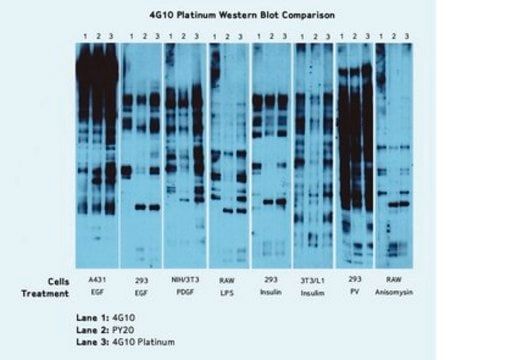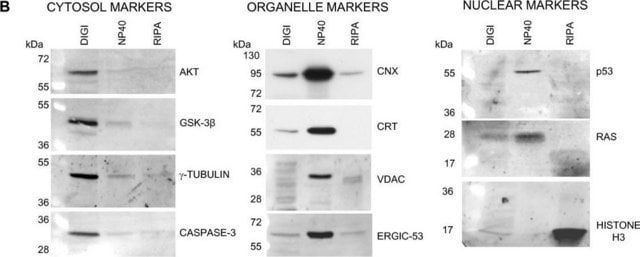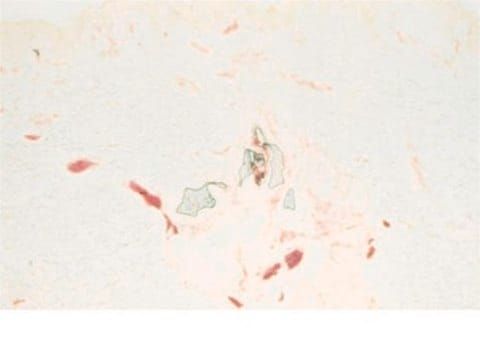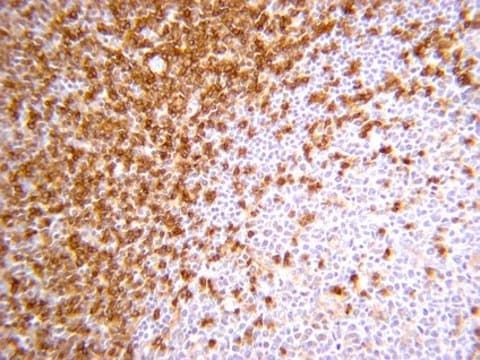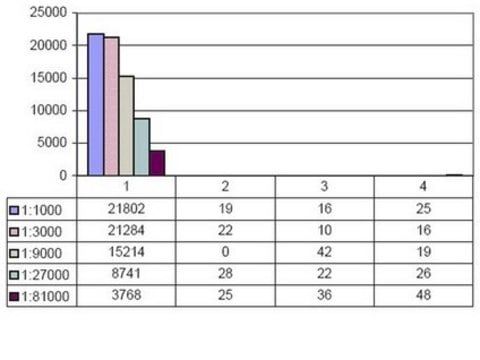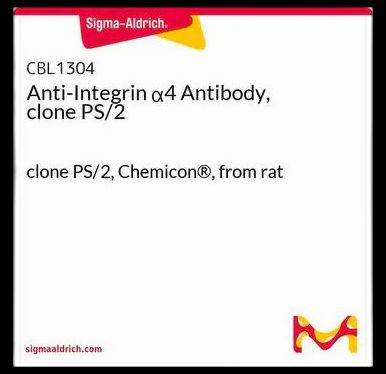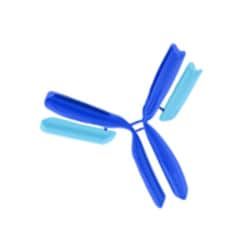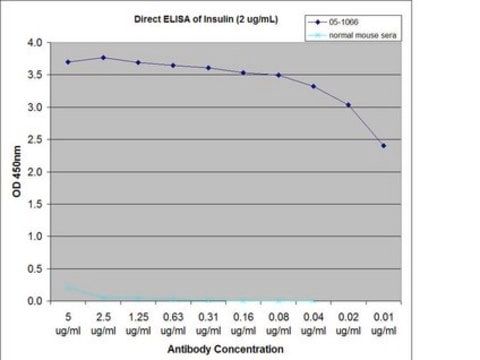05-1050-M
4G10® Platinum, Anti-Phosphotyrosine Antibody (mouse monoclonal cocktail IgG2b)
clone 4G10®, Upstate®, from mouse
Manufacturer: Sigma Aldrich
Synonym(S): Anti-phosphotyrosine antibody
Select a Size
| Pack Size | SKU | Availability | Price |
|---|---|---|---|
| 100 μL | 05-1050-M-100-μL | In Stock | ₹ 59,230.00 |
05-1050-M - 100 μL
In Stock
Quantity
1
Base Price: ₹ 59,230.00
GST (18%): ₹ 10,661.40
Total Price: ₹ 69,891.40
biological source
mouse
Quality Level
100
antibody form
purified immunoglobulin
antibody product type
primary antibodies
clone
4G10®, monoclonal
species reactivity (predicted by homology)
all
manufacturer/tradename
Upstate®
technique(s)
ELISA: suitableflow cytometry: suitableimmunocytochemistry: suitableimmunofluorescence: suitableimmunohistochemistry: suitableimmunoprecipitation (IP): suitablewestern blot: suitable
isotype
IgG2b
target post-translational modification
phosphorylation (pTyr)
Description
- General description: The development of the anti-phosphotyrosine, clone 4G10 in 1989 was a monumental discovery for researchers. 4G10 was the first and is the best single monoclonal antibody for the detection tyrosine phosphorylation. 4G10 is well known for its sensitivity and its ability to detect multiple tyrosine phosphorylations on numerous substrates. It has been validated by thousands of scientific and medical researchers in virtually every application and tyrosine target over the past 2 decades. To improve on something that hundred have tried and no one has succeeded, we pooled 4G10 with the next most highly regarded anti-phosphotyrosine, clone PY20 to make 4G10 Platinum. PY20 itself is a very poor substitute for 4G10, but its additive effect allow for a greater level of detection on more substrates that even 4G10 alone was not capable of.
- Specificity: Tyrosine-phosphorylated proteins from all species
- Immunogen: 4G10 used Phosphotyramine coupled to KLH and PY20 used phosphotyrosine conjugated to carrier protein
- Application: 4G10 Platinum, Anti-Phosphotyrosine (mouse monoclonal cocktail IgG2b) detects levels of Phosphotyrosine proteins & has been published & validated for use in WB, ICC, ELISA, IHC, IF, Flow & IP.
- Quality: Evaluated by Western Blot on a modified RIPA lysate from EGF-treated human A431 carcinoma cells.Western Blot Analysis: 1:1,000-1:2,000 of this antibody detected tyrosinephosphorylated proteins in a modified RIPA lysate from EGF-treated human A431 carcinoma cells.
- Target description: Dependent upon the molecular weight of the tyrosine phosphorylated protein being detected.
- Physical form: Format: Purified
- Storage and Stability: Stable for 1 year at from date of receipt.
- Analysis Note: ControlSuggested Positive Antigen Control: Cat. # 12-302, EGF-stimulated A431 cell lysate is provided as a free positive antigen control for western immunoblotting. Aliquot as desired, refreeze immediately, and store at -20ºC. The lysate is stable for 6 months at -20ºC. Before use, add 2.5 μL of 2-mercaptoethanol per 100 μL of lysate and boil for 5 minutes to reduce the preparation. Load 20 μg of reduced lysate per lane for immunoblot analysis.
- Legal Information: 4G10 is a registered trademark of Upstate Group, Inc.
- Disclaimer: Unless otherwise stated in our catalog or other company documentation accompanying the product(s), our products are intended for research use only and are not to be used for any other purpose, which includes but is not limited to, unauthorized commercial uses, in vitro diagnostic uses, ex vivo or in vivo therapeutic uses or any type of consumption or application to humans or animals.
SAFETY INFORMATION
Storage Class Code
12 - Non Combustible Liquids
WGK
WGK 1
Flash Point(F)
Not applicable
Flash Point(C)
Not applicable
Compare Similar Items
Show Difference
biological source: mouse
Quality Level: 100
antibody form: purified immunoglobulin
antibody product type: primary antibodies
clone: 4G10®, monoclonal
species reactivity (predicted by homology): all
manufacturer/tradename: Upstate®
technique(s): ELISA: suitableflow cytometry: suitableimmunocytochemistry: suitableimmunofluorescence: suitableimmunohistochemistry: suitableimmunoprecipitation (IP): suitablewestern blot: suitable
isotype: IgG2b
target post-translational modification: phosphorylation (pTyr)
biological source:
mouse
Quality Level:
100
antibody form:
purified immunoglobulin
antibody product type:
primary antibodies
clone:
4G10®, monoclonal
species reactivity (predicted by homology):
all
manufacturer/tradename:
Upstate®
technique(s):
ELISA: suitableflow cytometry: suitableimmunocytochemistry: suitableimmunofluorescence: suitableimmunohistochemistry: suitableimmunoprecipitation (IP): suitablewestern blot: suitable
isotype:
IgG2b
target post-translational modification:
phosphorylation (pTyr)
biological source: mouse
Quality Level: 100
antibody form: purified antibody
antibody product type: primary antibodies
clone: 4G10, monoclonal
species reactivity (predicted by homology): all
manufacturer/tradename: Upstate®
technique(s): ELISA: suitableflow cytometry: suitableimmunocytochemistry: suitableimmunofluorescence: suitableimmunohistochemistry: suitableimmunoprecipitation (IP): suitablewestern blot: suitable
isotype: IgG2b
target post-translational modification: __
biological source:
mouse
Quality Level:
100
antibody form:
purified antibody
antibody product type:
primary antibodies
clone:
4G10, monoclonal
species reactivity (predicted by homology):
all
manufacturer/tradename:
Upstate®
technique(s):
ELISA: suitableflow cytometry: suitableimmunocytochemistry: suitableimmunofluorescence: suitableimmunohistochemistry: suitableimmunoprecipitation (IP): suitablewestern blot: suitable
isotype:
IgG2b
target post-translational modification:
__
biological source: mouse
Quality Level: 100
antibody form: purified antibody
antibody product type: primary antibodies
clone: E11D7, monoclonal
species reactivity (predicted by homology): rat, mouse
manufacturer/tradename: __
technique(s): ELISA: suitableimmunohistochemistry: suitable (paraffin)
isotype: IgG1κ
target post-translational modification: __
biological source:
mouse
Quality Level:
100
antibody form:
purified antibody
antibody product type:
primary antibodies
clone:
E11D7, monoclonal
species reactivity (predicted by homology):
rat, mouse
manufacturer/tradename:
__
technique(s):
ELISA: suitableimmunohistochemistry: suitable (paraffin)
isotype:
IgG1κ
target post-translational modification:
__
